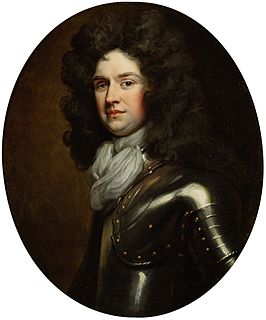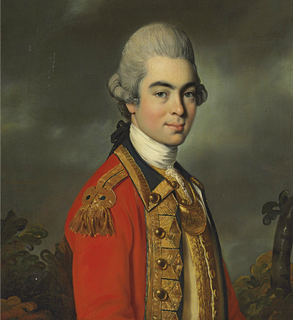
The Somerset Light Infantry was a light infantry regiment of the British Army, which served under various titles from 1685 to 1959. In 1959, the regiment was amalgamated with the Duke of Cornwall's Light Infantry to form the Somerset and Cornwall Light Infantry which was again amalgamated, in 1968, with the King's Own Yorkshire Light Infantry, the King's Shropshire Light Infantry and the Durham Light Infantry to form The Light Infantry. In 2007, however, The Light Infantry was amalgamated further with the Devonshire and Dorset Regiment, the Royal Gloucestershire, Berkshire and Wiltshire Regiment and the Royal Green Jackets to form The Rifles.
Lieutenant-General Sir Thomas Sydney Beckwith was an English officer of the British Army who served as quartermaster general of the British forces in Canada during the War of 1812, and a commander-in-chief of the Bombay Army during the British Raj. He is most notable for his distinguished service during the Peninsular War and for his contributions to the development and command of the 95th Rifles.
Junius was the pseudonym of a writer who contributed a series of political letters critical of the government of King George III to the Public Advertiser, from 21 January 1769 to 21 January 1772 as well as several other London newspapers such as the London Evening Post.

General Sir Charles Colville was a British Army officer who served during the Napoleonic Wars. He was an ensign in 1781. He served in the West Indies from 1791 to 1797 and while serving there was promoted to lieutenant-colonel (1796). He helped to suppress the Irish Rebellion of 1798. He was in Egypt in 1801 and fought at Martinique in 1809. He commanded brigade, and afterwards division, in the Peninsular War from 1810 until 1814. During the Waterloo Campaign of 1815 he commanded a division in Belgium and the same year was made a K.C.B. In 1819 he was promoted to lieutenant-general and served as commander-in-chief at Bombay from 1819 until 1825. He was governor of Mauritius from 1828 until 1834. He was promoted to general in 1837.

General David Colyear, 1st Earl of Portmore was a Scottish general and Governor of Gibraltar.

General John Francis Cradock, 1st Baron Howden was a British peer, politician and soldier.
Sir Isaac Campbell Coffin was an officer of the East India Company's military service who served during the company's rule in India, the First Anglo-Burmese War and the Indian Mutiny. He rose to the rank of major-general after a long career in India.

General Sir James Duff (1752–1839) was a British army officer, who fought in the Napoleonic wars and Member of Parliament (1784–1789).
James Fleming or Flemming was a British major-general, and colonel of the 36th (Herefordshire) Regiment of Foot.

James Dormer (1679–1741) was a British Army officer, a lieutenant-general, and colonel of the 1st troop of Horse Grenadier Guards
The Battle of Aberdeen was fought on 14 May 1646 during the Wars of the Three Kingdoms. George, Marquis of Huntly the commander of a Royalist army, defeated a force of Covenanters under the command of Hugh, Lord Montgomerie.

Richard Cannon (1779–1865) was a compiler of regimental records for the British Army.
William Courthope (1808–1866) was an English officer of arms, genealogist and writer, Somerset Herald from 1854.
Sir Francis John Bolton (1831–1887) was a British Army officer, known also as a telegraphic and electrical engineer.
Thomas Castle (c.1805–1837) was an English botanical and medical writer.
William Caulfeild, 2nd Viscount Charlemont was an Irish soldier and peer.
Nicholas Toms Carrington (1777–1830) was an English schoolmaster and poet.
General Sir John Wright Guise, 3rd Baronet was a British Army general.
Edmund Carter was an English surveyor, topographer and tutor, known as the author of the first county history of Cambridgeshire.
Thomas Corbett of Nash, Pembrokeshire, was a British Treasury official and politician who sat in the House of Commons from 1734 to 1751.
This page is based on this
Wikipedia article Text is available under the
CC BY-SA 4.0 license; additional terms may apply.
Images, videos and audio are available under their respective licenses.
![]() This article incorporates text from a publication now in the public domain : Stephen, Leslie, ed. (1887). "Carter, Thomas (d.1867)". Dictionary of National Biography . Vol. 9. London: Smith, Elder & Co.
This article incorporates text from a publication now in the public domain : Stephen, Leslie, ed. (1887). "Carter, Thomas (d.1867)". Dictionary of National Biography . Vol. 9. London: Smith, Elder & Co.





